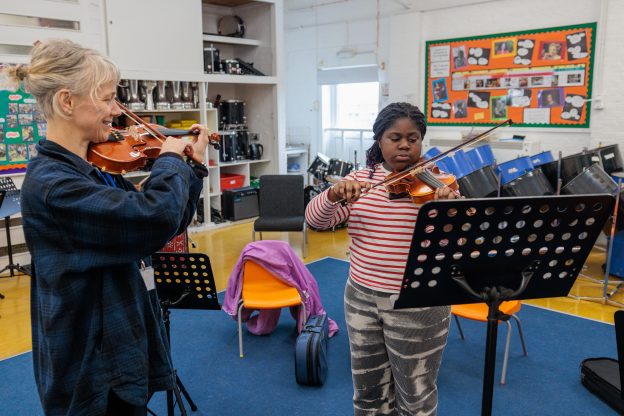Address:
William Patten Primary School
Stoke Newington Church Street
London N16 0NX
Office Manager: Rita Quigley
SENDCo: Caitlin Shaw
William Patten Primary School
Stoke Newington Church Street
London N16 0NX
Office Manager: Rita Quigley
SENDCo: Caitlin Shaw

Intent
The National Curriculum for music aims to ensure that all pupils:
At William Patten the intention is that children gain a firm understanding of what music is through listening, singing, playing, evaluating, analysing, and composing across a wide variety of historical periods, styles, traditions, and musical genres. Our objective at William Patten is to develop a curiosity for the subject, as well as an understanding and acceptance of the validity and importance of all types of music, and an unbiased respect for the role that music may wish to be expressed in any person’s life. We are committed to ensuring children understand the value and importance of music in the wider community, and are able to use their musical skills, knowledge, and experiences to involve themselves in music, in a variety of different contexts.
Implementation
The music curriculum ensures students sing, listen, play, perform and evaluate. These components are embedded in classroom activities, as well as the weekly singing assemblies, various concerts and performances, the learning of instruments, and the joining of one of our many musical ensembles. The elements of music are taught in the classroom lessons so that children are able to use some of the language of music to dissect it, and understand how it is made, played, appreciated and analysed. They key knowledge and skills for each year are mapped to ensure progression between years. This ensures that children develop their musical skills systematically, building their knowledge of music from one year to the next.
In the classroom students learn how to play an instrument, from all four main instrument groups of wind, strings, percussion and keyboards. In doing so, they are able to understand the different principle of each method of creating notes, as well as how to read basic music notation. They also learn how to compose, focussing on different dimensions of music, which in turn feeds their understanding when listening, playing, or analysing music. Composing or performing using body percussion and vocal sounds is also part of the curriculum, which develops the understanding of musical elements without the added complexity of an instrument.
Each new unit of work begins with a recap of the previous related knowledge from previous years. This helps children to retrieve what they have learnt in the earlier sequence of the programme of study, and ensures that new knowledge is taught in the context of previous learning to promote a shift in long term memory. Key vocabulary for the new topic is also introduced as part of this ‘unit introduction’ and children are shown the ‘Topic Vocabulary (TV) Mat. This provides definitions and accompanying visuals for each word to ensure accessibility to all. This approach also means that children are able to understand the new vocabulary when it is used in teaching and learning activities and apply it themselves when they approach their work.
The KWL process is used throughout each unit of work. Once children know the new vocabulary for the unit and how it relates to previous learning, the children are asked what they already know specifically about the new topic. This provides the teacher with an insight into the children’s ‘starting points’ for the topic, to enable the use of assessment to inform planning. The children are then also asked what they would like to know and class responses are collated and used to inform the programme of study to ensure an aspect of ‘focussed interest planning’. A record of this process kept in the class floor book which is collated by the music teacher. At the end of the topic, children take part in a review of what they now know and can do. This involves a review of the key knowledge, with reference to the TV (knowledge) mat. The teacher is then able consolidate any of the key knowledge which is identified at this part of the process as not yet being secure.
The school has a number of links with external organisations, which offer specific expertise in music as part of the core offer. This includes an ongoing link with the London Symphony Orchestra, as well as local links with, for example, the Hackney Music Service.
Impact
Whilst in school, children have access to a varied programme, which allows students to discover areas of strength, as well as areas they might like to improve upon. The integral nature of music and the learner creates an enormously rich palette from which a student may access fundamental abilities such as: achievement, self-confidence, interaction with and awareness of others, and self-reflection. The Music curriculum at William Patten also enables children to develop an understanding of culture and history, both in relation to students individually, as well as ethnicities from across the world. Children are able to enjoy music, in as many ways as they choose- either as listener, creator or performer. They can dissect music and comprehend its parts. They can sing and feel a pulse. They have an understanding of how to further develop skills less known to them, should they ever develop an interest in their lives. Regular concerts at school and the school’s involvement in local musical events, including the annual music festival, ensure that children are confident performers. They also provide further means to showcase the impact of the school’s high-quality music provision. The school was shortlisted for an ‘Excellence in Music Education Practice’ Awards at the Hackney Music Gala and Mayor’s Awards 2019.